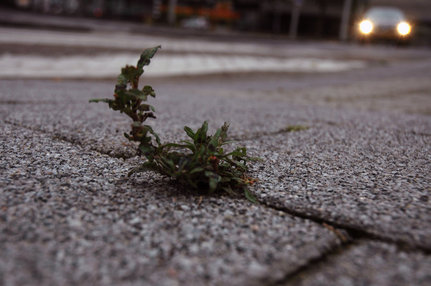 In the first ecotherapy post I tackled the question of why connect with nature? This second post answers the question: if I'm already connected to nature, why would I be interested in ecotherapy? My first question to you is how deep does your connection to nature go? This is a question I often ask myself. Do we have any conception or experience of how deeply it is possible to connect with nature? Like an old growth tree, the roots of this question spread far and wide, down towards the bedrock of our lives. Looking out at the world around me at this very moment, do I feel a deep sense of belonging and intimacy, or is there a sense of alienation and distance? Do the people, objects, and places with which I fill my life actually feel alive. Do I? Of course to be alive, to let ourselves and others live is a risk. What lives will be hurt, sooner or later. What we think of as the natural world shows us this in plenty. Weather and the elements can be harsh - from our human point of view we impute mercilessness. Animals exist in relationships of predator and prey, in which morality seems to play no part. Plants flourish abundantly, but are harvested or destroyed just as abundantly, seemingly without protest. No wonder we have constructed sterile and protected environments for ourselves, where decay, disease, risk, and aggression are banished or tightly controlled in an attempt to obliterate fear completely. But, if you already experience some connection with nature, then you probably understand on some level that the price of complete control is our sense of aliveness, and that that price is not worth paying. Connecting with the natural processes of our world evokes our personal vulnerability, but human consciousness can adapt to tolerate this. After all, we are animals, inescapably, and the job of an animal is to live as much as it is to die. The more deeply we are conscious of and connected to nature, however, the more deeply we are confronted with vulnerability. In the context of connection, our collective vulnerability in the face of climate change, and other so-called environmental issues breaks through into consciousness. We allow ourselves to digest information about these events that we have previously avoided. We allow ourselves to feel the emotions appropriate to the scale of the existential threat to our civilisations, cultures, and communities. These feelings may include dread, fear, anger, numbness, and grief. If we don't shut down in the face of these raw emotions, allowing our minds and hearts to remain open, we will also be able to feel hope. Acting on that hope, and connecting with others who are doing the same, we can feel joy and a deep sense of purpose. If all of this sounds like a lot to deal with, then I can only say that I'd have to agree. That's one of the reasons why ecotherapy exists, to guide, help and provoke those who want to meet the individual and collective challenges of being awake and alive in the 21st century.
0 Comments
Leave a Reply. |
AuthorsMichael Apathy and Selina Clare are practitioners of psychotherapy at Lucid who are excited about fresh, innovative, and effective therapy for individual and environmental change. Categories
All
Archives
December 2016
|
Specialty Areas |
Online BookingBook my first session.
If there are no bookable services showing via the online booking website, this means we currently have a waiting list for new clients. Please give us a call or email if you would like to add your name to it. |
 RSS Feed
RSS Feed